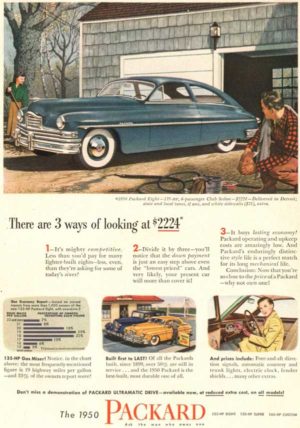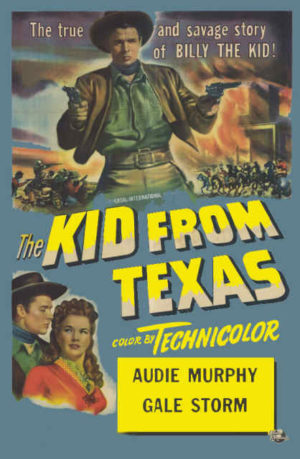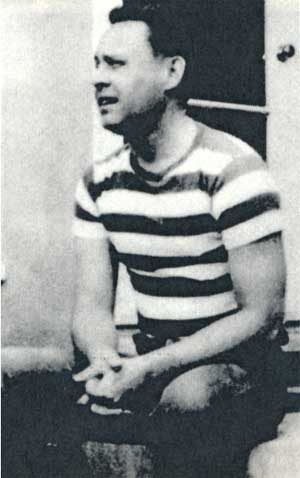 The nightmare began as many such nightmares did for gay men in Los Angeles in the 1950s. On March, 21, 1952, Dale Jennings was walking around the neighborhood, thinking about seeing a movie. He passed two theaters, but their offerings didn’t interest him. He set out for a third theater. But then nature called, and he stopped in a public men’s room at Westlake Park (now MacArthur Park). A stranger walked up to Jennings and fondled himself. Jennings wasn’t interested. “Having done nothing that the city architect didn’t have in mind when he designed the place, I left,” Jennings later explained.
The nightmare began as many such nightmares did for gay men in Los Angeles in the 1950s. On March, 21, 1952, Dale Jennings was walking around the neighborhood, thinking about seeing a movie. He passed two theaters, but their offerings didn’t interest him. He set out for a third theater. But then nature called, and he stopped in a public men’s room at Westlake Park (now MacArthur Park). A stranger walked up to Jennings and fondled himself. Jennings wasn’t interested. “Having done nothing that the city architect didn’t have in mind when he designed the place, I left,” Jennings later explained.
The man, however, insisted on striking up a conversation and following Jennings home. Jennings tried to shake him several times, saying goodbye to him at every street corner, but the man persisted. When they arrived at Jennings’s Echo Park apartment, Jennings said good-bye once more and went inside. But the man pushed his way in. Now Jennings worried that the man may be some kind of a thug, perhaps a robber.
When we read about entrapment case involving gay men, we very rarely get a detailed description of what that entrapment looked like. I certainly don’t think I’ve ever read anything so bold as what Jennings later wrote for the inaugural issue of ONE magazine:
Sure now that this big character was a thug, I — as the prosecutor described it –“flitted” wildly from room to room wondering how to get rid of this person sprawled on the divan making sexual gestures and proposals. I was almost relieved when he strolled into the back bedroom because now I could call the police. What I’d have said to them, I don’t know and what he’d have done if he’d heard, was up to luck. Then he called twice, “Come in here!” His voice was loud and commanding. He’d taken his jacket off, was sprawled.on the bed and his shirt was unbuttoned half way down. During the tense conversation there, he asked me what kind of work I did, how much I made, and what the rent here was. Then he slapped the bed and said, “Sit down.” Now he insisted that I was homosexual and urged me to “let down my hair.” He’d been in the Navy and “all us guys played around.” I told him repeatedly that he had the wrong guy; he got angrier each time I said it. At last he grabbed my hand and tried to force it down the front of his trousers. I jumped up and away. Then there was the badge and he was snapping the handcuffs on with the remark, “Maybe you’ll talk better with my partner outside.”
Jennings was walked out to the car in handcuffs. Then the real terror began:
I was forced to sit in the rear of a car on a dark street for almost an hour while three officers questioned me. It was a particularly effective type of grilling. They laughed a lot among themselves. Then, in a sudden silence, one would ask, “How long have you been this way?”I sat on my hands and wondered what would happen each time I refused to answer. Yes, I was scared stiff. … At last the driver started the car up. Having expected the usual beating before, now I was positive it was coming — out in the country somewhere. They drove over a mile past the suburb of Lincoln Heights, then slowly doubled back. During this time they repeatedly made jokes about police brutality, and each of the three instructed me to plead guilty and everything would be all right.
The long drive, of course, was deliberate — and a well known tactic. It was known as the “sweat-out.” Sometimes it involved a beating, sometimes it didn’t. In Jennings’s case, it didn’t, but the slow ride to the station probably lasted about an hour, in addition to the hour they spent parked on the street. The undercover officer first approached Jennings a little past nine. Jennings wasn’t booked until 11:30, and he wasn’t allowed to make a phone call until 3:00 a.m.
He was charged with “lewd and lascivious conduct.” He remained in jail until the following morning, when Harry Hay paid the $50 bail ($450 today). The two of them, along with several others, had founded the Mattachine Society two years earlier, and Jennings’s troubles would become the fledgling organization’s first gay rights victory.
But first, Hay had to convince Jennings to put his name on the line. During the 1950s, gay men absolutely never fought this kind of a trial. Instead, they’d post bail, and forfeited it later rather than show up at court for the misdemeanor charge.
But that morning, as Hay and Jennings sat in the Brown Derby restaurant talking about what happened, Hay said, “Look, we’re going to make an issue of this thing. We’ll say you are a homosexual but neither lewd nor dissolute. And that the cop is lying.”Jennings remembered the conversation later in an unpublished manuscript:
(Hay was) the only tall person I ever met who used it with the imperial self-confidence of the chosen. … From his great height, he laid hear hands on my shoulders, stared intensely down at me in his best S.AG. (Screen Actors Guild) style, and made his great and solemn pitch. … The Great Man pointed out that I, in my miserable way, would be somewhat Chosen, too, if I stood up to the Establishment. I had nothing to lose by my chains. After all, working in a family business, I couldn’t get fired. Being recently divorced, it would not hurt my wife and I could continue at USC as something of a hero if the straights on campus didn’t go to work on me as they did all the fairies. He himself would be honored to do such a thing, but of course, he had too many familial responsibilities. Oh, I was lucky.
At this time, the Mattachine Society was organized like a pyramid, with the Discussion Groups at the bottom, and then the First Order, the Second Order, through the Fifth Order on top. First Order members led the Discussion Groups. Second Order members coordinated between the First Order and the Fifth. (In practice, the Second through Fourth Orders were never established.) The Fifth Order, which had filed paperwork to incorporate as the Mattachine Foundation, was the public face of the Mattachine Society, although the actual leaders remained anonymous. Hay, Jennings, and the other founders were the Fifth Order.
Hay called an emergency meeting of the Fifth Order that night. When he and Jennings presented their plan, there was surprisingly little dissension. But there was still a considerable amount of fear. They felt it was still necessary to protect the Foundationas a secret society. So they did what a lot of secret organizations did. They created a front organization, the Citizens Committee to Outlaw Entrapment
Their first task was to raise money for Jennings’s defense. At first ,they found resistance. For most of the people in the discussion groups, harassment and entrapment was just an ordinary part of their lives. They hadn’t bothered to question it. And besides, the rumor was that he was guilty. For them, the Fifth Order’s response went more or less like this: “You think he’s guilty? So what? The laws aren’t fair, they’re not being fairly enforced, and entrapment, while illegal, is rampant. Aren’t those reason enough to support the case?” The very idea of fighting these charges was daring and new — and exhilarating. Word spread, and suddenly the discussion groups had more people showing up than ever before.
The CCOE organized at least two major fundraising events, including what might possibly be the first public benefit for a gay rights cause. Lester Horton, whose dance company was opening a new season in Los Angeles, offered an eventing’s take. One of his dancers had been entrapped that year, and besides, Horton backed a lot of progressive causes. The May 23 benefit wasn’t advertised as a fundraiser, but most of those attending the nearly sold-out performance knew what it was.
The CCOE also used the Jennings case to raise awareness in the broader gay community. The “Call to Arms” leaflet was just one example. Distributed to gay bars, public restrooms and beaches, it detailed the sad outcomes of those who had meekly acquiesced to the charges, bullying, and blackmail stemming from entrapment. It described
…the man who parted with his valuable art collection … piece by piece … his savings account … when he was wrung dry was turned in anyway; the professional man who paid $3,000 to get a trumped-up charge reduced to “disturbance of the peace”; the West Los Angeles businessmen who pay for protection against false witnessing every week; the dozens of youngsters who are offered rides by “lonely or maudlin” decoys in wolfs clothing and stampeded into milking the family’s savings or turning over the names and addresses of acquaintances who might make likely entrapment candidates.
The group also hired George Shibley, an Arab-American lawyer with a solid reputation for taking on controversial civil rights and union causes in the 1930s and ’40s. On June 23, the case went to trial. Jennings recalled what happend for ONE:
The attorney, engaged by the Mattachine Foundation, made a brilliant opening statement to the jury in which he pointed out that homosexuality and lasciviousness are not identical after stating that his client was admittedly homosexual, that no fine line separates the variations of sexual inclinations and the only true pervert in the courtroom was the arresting officer. He asked, however, that the jury feel no prejudice merely because I’d been arrested: these two officers weren’t necessarily guilty of the charges of beating another prisoner merely because they were so accused; it would take a trial to do that and theirs was coming the next day. The jury deliberated for forty hours and asked to be dismissed when one of their number said he’d hold out for guilty till hell froze over. The rest voted straight acquittal. Later the city moved for dismissal of the case and it was granted.
Jennings was stunned. As he later wrote in his unpublished memoirs:
Walking out of the courtroom free was a liberation that I’d never anticipated. It didn’t happen in our society. You went to jail for that sort of thing. And so I was numb for some time, and it began to dawn on me that we did have a victory.
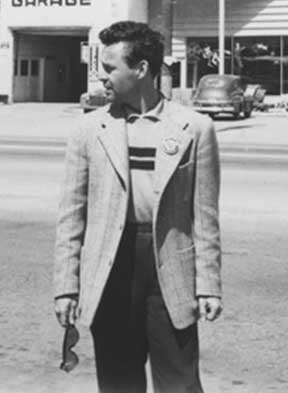 Newspapers ignored the story, but the news spread all over gay Los Angeles virtually overnight. Everyone wanted to know who was behind this unprecedented victory. Mattachine capitalized on the news with a “victory” flyer: “You didn’t see it in the papers, but it could — and did — happen in L.A.: In a unique victory, Dale Jennings defended himself against entrapment by the L.A. Police and won.” The flyer urged readers to “give now to help eliminate gangster methods by the police. A contribution now may save you thousands if you become the next target of entrapment.”
Newspapers ignored the story, but the news spread all over gay Los Angeles virtually overnight. Everyone wanted to know who was behind this unprecedented victory. Mattachine capitalized on the news with a “victory” flyer: “You didn’t see it in the papers, but it could — and did — happen in L.A.: In a unique victory, Dale Jennings defended himself against entrapment by the L.A. Police and won.” The flyer urged readers to “give now to help eliminate gangster methods by the police. A contribution now may save you thousands if you become the next target of entrapment.”
Through flyers like these and word of mouth, the Mattachine Foundation experienced dramatic growth. Meetings overflowed and new discussion groups sprouted all over Southern California. By early 1953, discussion groups had formed in Long Beach, Laguna Beach, San Diego, Fresno, the Bay area, and even as far away as Chicago.
Epilogue:
Organizations ordinarily welcome growth. The Mattachine Foundation certainly did, for good reason. Many of these new members will become important figures in the gay rights movement throughout the next decade. Jim Kepner, a journalist and writer for ONE and, later, the Advocate, was just one of those newcomers. But he and the other future leaders were the exceptions. He later observed:
The exciting Mattachine growth brought on by the Dale Jennings case victory brought an unexpected backlash. Even as the Society drew in hundreds of enthusiastic new participants and set up membership guilds to inspire them with Mattachine ideals, (some of the co-founders) became aware how resistant most of the new people were to those ideals. … Ready to fight for their own rights, they had no desire to change the world, and no philosophy other than their conformist, bourgeois, Christian notions. Hardly rebels, they merely wanted an equal share of apple pie for gays. Above all, they wanted the right of privacy. There was increasing disjunction between Mattachine as the founders variously conceived it and what it was actually coming to be.
Another crack in the Foundation formed with Jennings himself. Conflicted about his martyrdom status, the feisty and opinionated Jennings never shied from expressing his misgivings, even if he saw the court fight as an important win. You can see this in the final paragraphs from his ONE magazine account:
Actually I have had very little to do I with this victory. Yes, I gave my name and publicly declared myself to be a homosexual, but the moment I was arrested my name was no longer “good” and this incident will stand on record for all to see for the rest of my life. In a situation where to be accused is to be guilty, a person’s good name is worthless and meaningless. Further, without the interest of the Citizens’ Committee to Outlaw Entrapment and their support which gathered funds from all over the country, I would have been forced to resort to the mild enthusiasm of the Public Defender. Chances are I’d have been found guilty and now be either still gathering funds to pay the fine or writing this in jail.
Yet I am not abjectly grateful. All of the hundreds, who helped push this case to a successful conclusion, were not interested in me personally. They were being intelligently practical and helping establish a precedent that will perhaps help themselves if the time comes. In this sense, a bond of brotherhood is not mere blind generosity. It is unification for self-protection. Were all homosexuals and bisexuals to unite militantly, unjust laws and corruption would crumble in short order and we, as a nation, could go on to meet the really important problems which face us. Were heterosexuals to realize that these violations of our rights threaten theirs equally, a vast reform might even come within our lifetime. This is no more a dream than trying to win a case after admitting homosexuality.
In the spring of 1953, the leaders of the Mattachine Foundation decided to begin developing its political muscles. They sent a letter explaining the organization, along with a brief questionnaire, to candidates for the Los Angeles City Council, Mayor, and Board of Supervisors to ascertain their positions on police harassment of gay people.
The letter and questionnaire found its way into the hands of Paul Coates, a Los Angeles Daily Mirror columnist. This time, the publicity backfired within Mattachine. Within two months, these newer members forced the collapse of the original Mattachine Foundation and ushered in a much more timid Mattachine Society.
But by then, Jennings had already left to become the first managing editor of ONE magazine, the first nationally distributed publication for a gay audience. His account of his arrest and trial appeared in the magazine’s first issue, which helped to spread the news further. The case didn’t bring an end to police harassment of gay men in Los Angeles. That continued for at least two more decades. But it did signal to the nation’s fearful gay community that false charges could be fought and defeated.
Read More:
David Hughes, Blown Cover: The Arrest of Dale Jennings. Hughes provides a much more detailed account, along with the identities of the two police officers who arrested Jennings.
On the Timeline:
![]() Jun 23: Dale Jennings is cleared of a morals charge despite acknowledging that he is a homosexual.
Jun 23: Dale Jennings is cleared of a morals charge despite acknowledging that he is a homosexual.
Periscope:
For June 23, 1952:
| President: | Harry S. Truman (D) | |||
| Vice-President: | Alben W. Barkley (D) | |||
| House: | 231 (D) | 200 (R) | 1 (Other) | 3 (Vacant) |
| Southern states: | 103 (D) | 2 (R) | ||
| Senate: | 50 (D) | 46 (R) | ||
| Southern states: | 22 (D) | |||
| GDP growth: | 2.2% | (Annual) | ||
| 0.7% | (Quarterly) | |||
| Inflation: | 2.3% | |||
| Unemployment: | 3.0% | |||
| US killed in action, | 581 | (This month) | ||
| Korean conflict: | 29,201 | (Since Jun 28, 1950) | ||
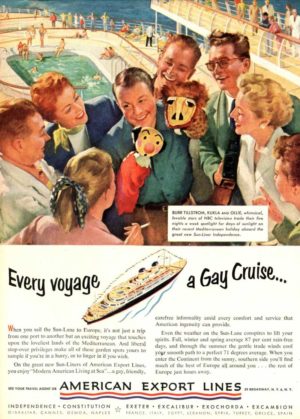 Headlines: U.N. planes bomb hydroelectric dams on the Yalu River, cutting North Korean electricity by 90%. A nationwide steel strike enters its fourth week with no resolution in sight. Sen. Robert Taft (D-OH) says he has the votes to defeat Gen. Dwight D. Eisenhower for GOP nomination. Eisenhower warns against Taft’s isolationism. Argentina’s First Lady Eva Peron is reported to be dying of leukemia. A study reveals that radioactivity increased tenfold in California since the start of nuclear testing in Nevada in 1951.
Headlines: U.N. planes bomb hydroelectric dams on the Yalu River, cutting North Korean electricity by 90%. A nationwide steel strike enters its fourth week with no resolution in sight. Sen. Robert Taft (D-OH) says he has the votes to defeat Gen. Dwight D. Eisenhower for GOP nomination. Eisenhower warns against Taft’s isolationism. Argentina’s First Lady Eva Peron is reported to be dying of leukemia. A study reveals that radioactivity increased tenfold in California since the start of nuclear testing in Nevada in 1951.
 In the record stores: Here In My Heart by Al Martino, Delicado by Percy Faith and His Orchestra, Blue Tango by Leroy Anderson, Kiss of Fire by Georgia Gibbs, Auf Wiederseh’n Sweetheart by Vera Lynn, I’m Yours by Eddie Fisher, Kiss of Fire by Tony Martin, Walkin’ My Baby Back Home by Johnnie Ray, I’m Yours by Don Cornell, Guy Is a Guy by Doris Day.
In the record stores: Here In My Heart by Al Martino, Delicado by Percy Faith and His Orchestra, Blue Tango by Leroy Anderson, Kiss of Fire by Georgia Gibbs, Auf Wiederseh’n Sweetheart by Vera Lynn, I’m Yours by Eddie Fisher, Kiss of Fire by Tony Martin, Walkin’ My Baby Back Home by Johnnie Ray, I’m Yours by Don Cornell, Guy Is a Guy by Doris Day.

On the radio: Lux Radio Theater (CBS), Amos & Andy (CBS), Jack Benny Program (CBS), Edgar Bergen & Charlie McCarthy (CBS), Arthur Godfrey’s Talent Scouts (CBS), People Are Funny (CBS), You Bet Your Life (NBC), Fibber McGee & Molly (NBC), Bob Hawk Show (CBS), Life With Luigi (CBS), Suspense (CBS).
On television: Arthur Godfrey’s Talent Scouts (CBS), Texaco Star Theater, w/Milton Berle (NBC), I Love Lucy (CBS), The Red Skelton Show (NBC), The Colgate Comedy Hour (NBC), Arthur Godfrey and His Friends (CBS), Fireside Theater (NBC), Your Show of Shows, w/Cid Caesar & Imogene Coca (NBC), You Bet Your Life, w/Groucho Marx (NBC).
New York Times best sellers: Fiction: The Caine Mutiny by Herman Wouk, My Cousin Rachel by Daphne du Maurier, The Gown of Glory by Agnes Sligh Turnbull. Non-fiction: Witness by Whittaker Chambers, The Sea Around Us by Rachel Carson, A Man Called Peter by Catherine Marshall.
Sources:
Douglas M. Charles. “From Subversion to Obscenity: The FBI’s Investigations of the Early Homophile Movement in the United States, 1953-1958.” Journal of the History of Sexuality 19, no. 2 (May 2010): 262-287.
David Hughes, “Blown Cover: The Arrest of Dale Jennings.” The Tangent Group website (January 4, 2018, retrieved August 5, 2018).
Dale Jennings. “To be accused is to be guilty.” ONE 1, no. 1 (January 1953): 10-13.
John Loughery. The Other Side of Silence: Men’s Lives and Gay Identities: A Twentieth Century History (New York: Henry Holt & Co., 1998): 223.
James T. Sears. Behind the Mask of the Mattachine: The Hall Call Chronicles and the Early Movement for Homosexual Emancipation (Binghamton, NY: Harrington Park Press, 2006): 152, 162-164.
Stewart Timmons. The Trouble With Harry Hay: Founder of the Modern Gay Rights Movement (Harry Hay Centenary edition, White Crane Books, 2012): 182-187.
C. Todd White. Pre-Gay LA: A Social History of the Movement for Homosexual Rights (Urbana, IL: University of Chicago Press, 2009): 23-27. White quotes from Jennings’s unpublished manuscript.
![[Emphasis Mine]](http://jimburroway.com/wp-content/uploads/2018/01/KissInProtestToronto.jpg)
 I wish it were possible for me to wr1te this on my letterhead, but my “world” would be too shocked if they were to learn their perfectly proper and “normal” appearing friend, business and professional member of their society were any different than she appears. And more shocked to know that she is secretly glad to be a Lesbian.
I wish it were possible for me to wr1te this on my letterhead, but my “world” would be too shocked if they were to learn their perfectly proper and “normal” appearing friend, business and professional member of their society were any different than she appears. And more shocked to know that she is secretly glad to be a Lesbian.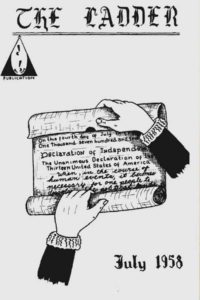 I was touched by your article, “Yes, I Am” in the March edition of THE LADDER; touched, and a little terrified.
I was touched by your article, “Yes, I Am” in the March edition of THE LADDER; touched, and a little terrified.
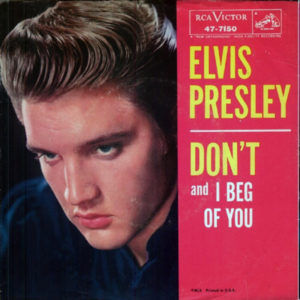 On the radio: “Don’t” by Elvis Presley, “Get a Job” by the Silhouettes, “Sweet Little Sixteen” by Chuck Berry, “Short Shorts” by the Royal Teens, “Oh Julie” by the Crescendos, “26 miles (Santa Catalina)” by the Four Preps, “Who’s Sorry Now” by Connie Francis, “The Walk” by Jimmie McCracklin and His Band, “Tequila” by the Champs, “The Stroll” by the Diamonds, “At the Hop” by Danny and the Juniors, ,”Lollipop” by the Chordettes, “Breathless” by Jerry Lee Lewis.
On the radio: “Don’t” by Elvis Presley, “Get a Job” by the Silhouettes, “Sweet Little Sixteen” by Chuck Berry, “Short Shorts” by the Royal Teens, “Oh Julie” by the Crescendos, “26 miles (Santa Catalina)” by the Four Preps, “Who’s Sorry Now” by Connie Francis, “The Walk” by Jimmie McCracklin and His Band, “Tequila” by the Champs, “The Stroll” by the Diamonds, “At the Hop” by Danny and the Juniors, ,”Lollipop” by the Chordettes, “Breathless” by Jerry Lee Lewis.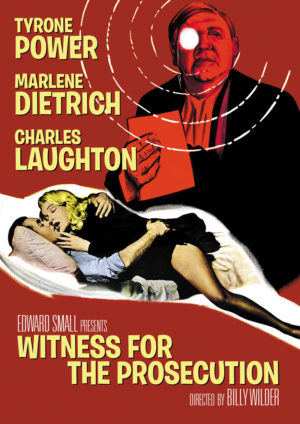
 In 1958, WABD, the former flagship station of the defunct DuMont network, decided to host a discussion of homosexuality on its half-hour afternoon public affairs program, Showcase. Its producer decided it might be interesting to have a real live homosexual on live television. He contacted Tony Segura, the New York chapter president of the Mattachine Society. Segura agreed to appear, on the condition that his name wasn’t mentioned and he could wear motorcycle goggles while on the air to hide his face. Those precautions were important: homosexuality was a felony in New York, punishable with up to twenty years in prison.
In 1958, WABD, the former flagship station of the defunct DuMont network, decided to host a discussion of homosexuality on its half-hour afternoon public affairs program, Showcase. Its producer decided it might be interesting to have a real live homosexual on live television. He contacted Tony Segura, the New York chapter president of the Mattachine Society. Segura agreed to appear, on the condition that his name wasn’t mentioned and he could wear motorcycle goggles while on the air to hide his face. Those precautions were important: homosexuality was a felony in New York, punishable with up to twenty years in prison. Headlines: Rep. John J. Dempsey (D-NM) dies at the age of 78 from a viral infection; he had been hospitalized for two weeks. The unemployment rate reachers 6.7%, surpassing the peak unemployment rate of the 1953-1954 recession. Congressional representatives from both parties call for increasing unemployment insurance and accelerating public works spending to combat rising unemployment in the eight-month-old recession. Vice President Nixon says he favors a tax cut over increased spending if more anti-receission measures are needed. A B-47 bomber accidentally drops an unarmed atomic bomb onto a farm near Florence, South Carolina. Cuban dictator Fulgencio Batista promises to hold fair elections on June 1 amid continuing violence with Fidel Castro’s armed rebels.
Headlines: Rep. John J. Dempsey (D-NM) dies at the age of 78 from a viral infection; he had been hospitalized for two weeks. The unemployment rate reachers 6.7%, surpassing the peak unemployment rate of the 1953-1954 recession. Congressional representatives from both parties call for increasing unemployment insurance and accelerating public works spending to combat rising unemployment in the eight-month-old recession. Vice President Nixon says he favors a tax cut over increased spending if more anti-receission measures are needed. A B-47 bomber accidentally drops an unarmed atomic bomb onto a farm near Florence, South Carolina. Cuban dictator Fulgencio Batista promises to hold fair elections on June 1 amid continuing violence with Fidel Castro’s armed rebels.
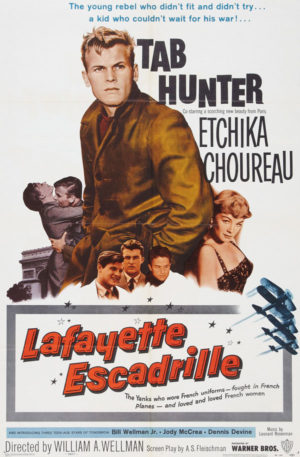
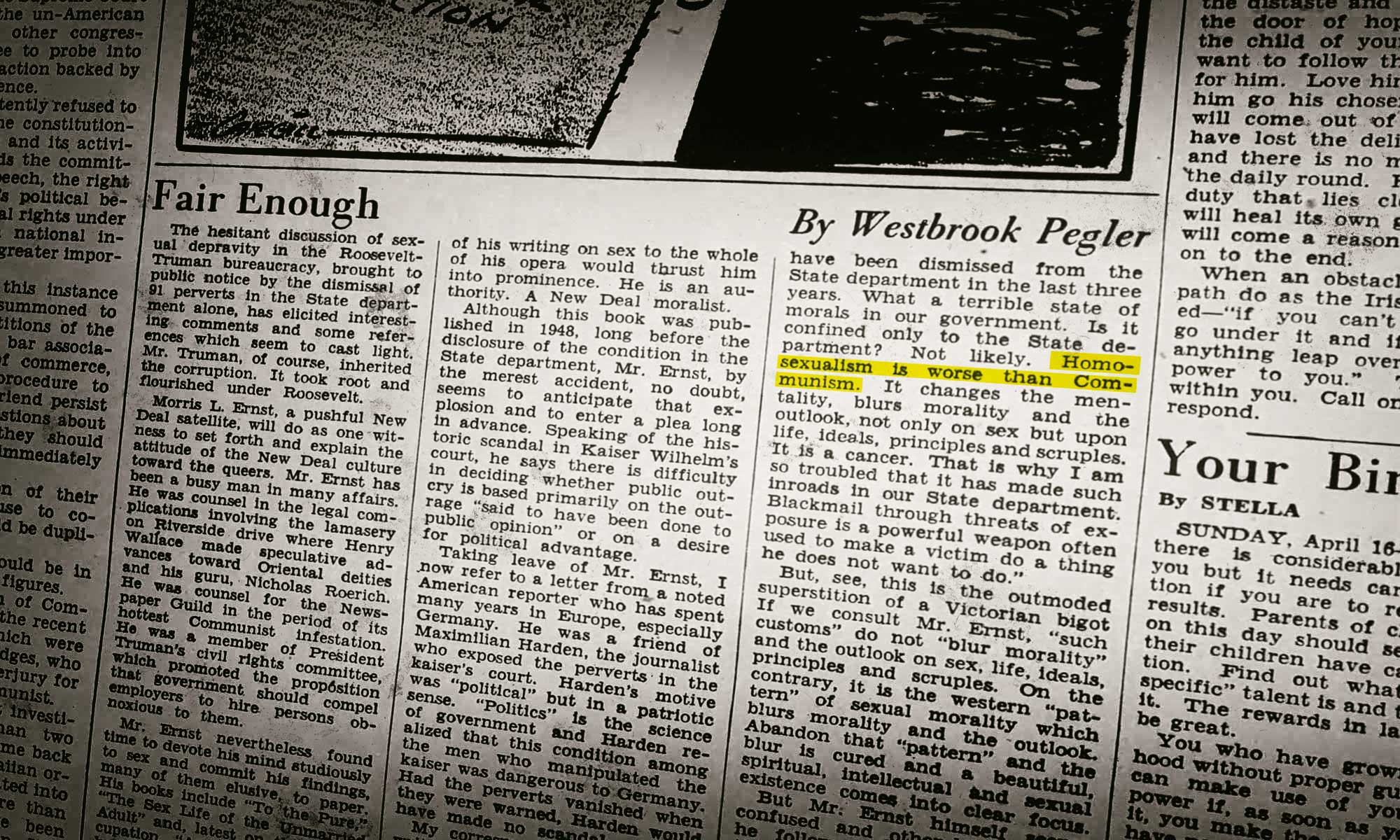
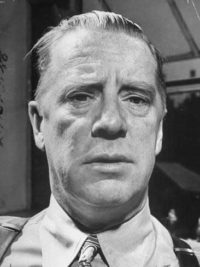 The Angry Man of the Press struck again against his favorite targets: the Roosevelts, the New Deal, and homosexuals.
The Angry Man of the Press struck again against his favorite targets: the Roosevelts, the New Deal, and homosexuals. 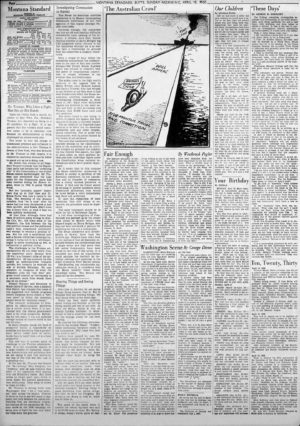
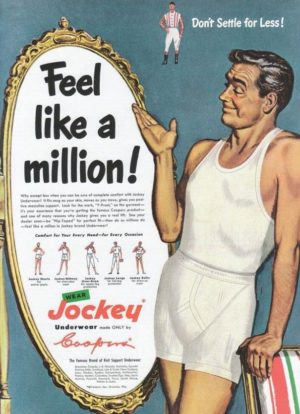
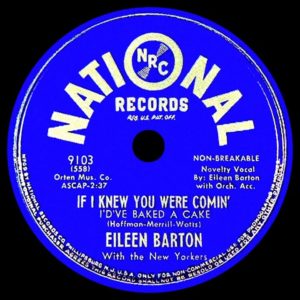 In the record stores: “If I Knew You Were Comin’ I’d’ve Baked a Cake” by Eileen Barton, “The Third Man Theme” by Anton Karas, “Music! Music! Music!” by Teresa Brewer, “It Isn’t Fair” by Don Cornell and the Sammy Kaye Orchestra, “The Third Man Theme” by Guy Lombardo and His Orchestra, “Peter Cottontail” by Gene Autry, “Chattanoogie Shoe Shine Boy” by Red Foley, “Sentimental Me” by the Ames Brothers, “Peter Cottontail” by Merv Shiner, “My Foolish Heart” by the Gordon Jenkins Orchestra.
In the record stores: “If I Knew You Were Comin’ I’d’ve Baked a Cake” by Eileen Barton, “The Third Man Theme” by Anton Karas, “Music! Music! Music!” by Teresa Brewer, “It Isn’t Fair” by Don Cornell and the Sammy Kaye Orchestra, “The Third Man Theme” by Guy Lombardo and His Orchestra, “Peter Cottontail” by Gene Autry, “Chattanoogie Shoe Shine Boy” by Red Foley, “Sentimental Me” by the Ames Brothers, “Peter Cottontail” by Merv Shiner, “My Foolish Heart” by the Gordon Jenkins Orchestra.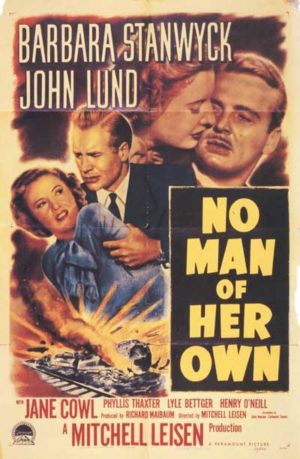
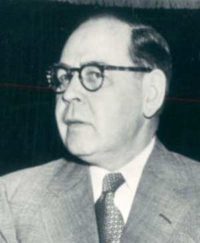 As Americans, it is difficult for us to believe that a National Administration would go to such length to cover up and protect subversives, traitors, working against their country in high Governmental places. But it is happening. If there is but one more (Alger) Hiss or (Judith) Coplon still in a key spot, he should be ferreted out. It’s no red herring.
As Americans, it is difficult for us to believe that a National Administration would go to such length to cover up and protect subversives, traitors, working against their country in high Governmental places. But it is happening. If there is but one more (Alger) Hiss or (Judith) Coplon still in a key spot, he should be ferreted out. It’s no red herring.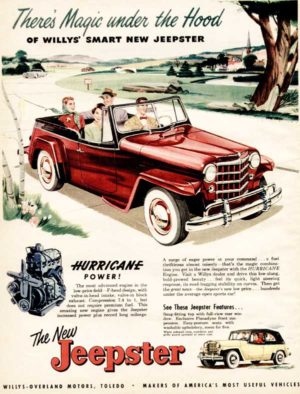

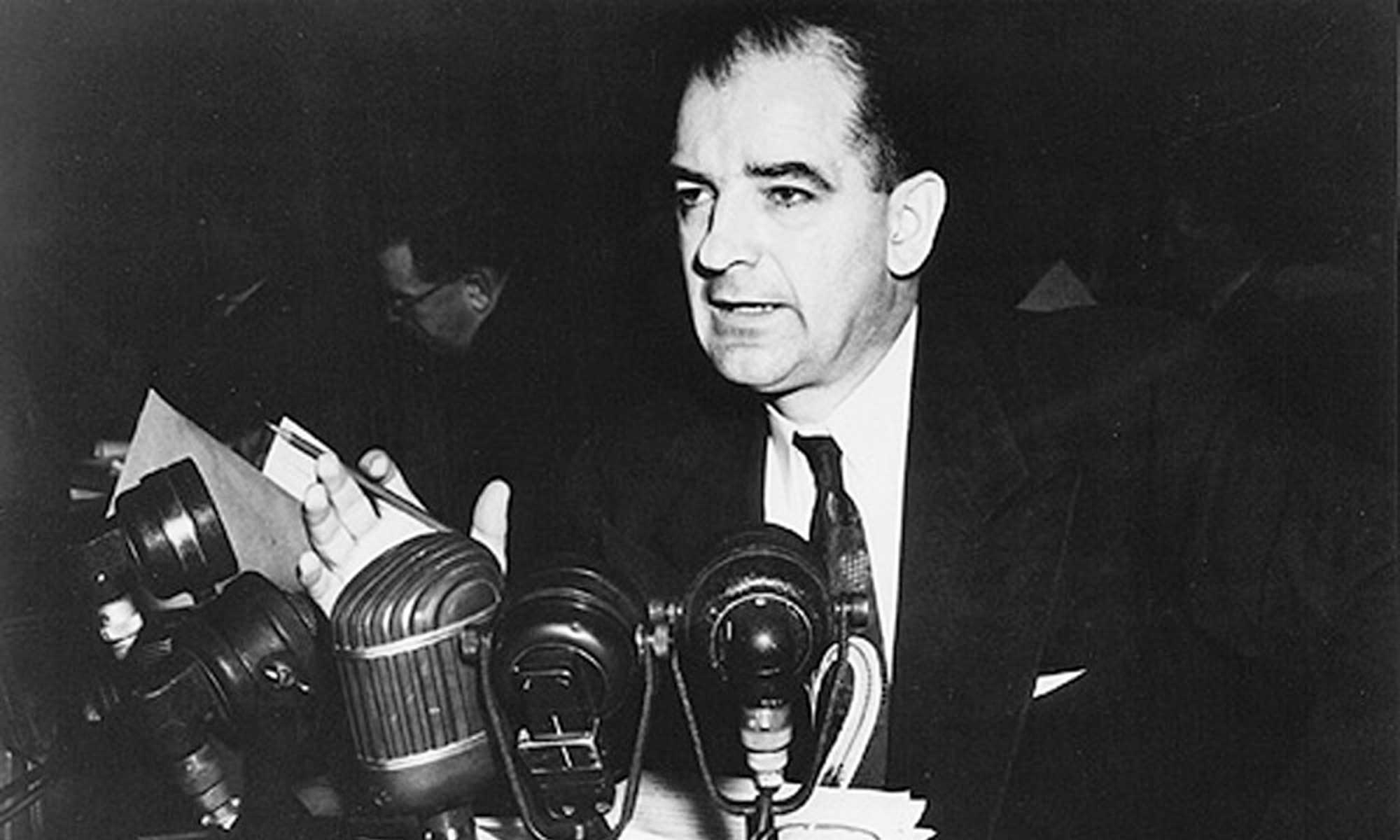
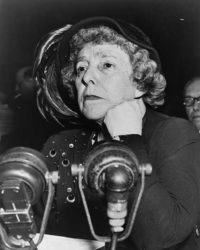
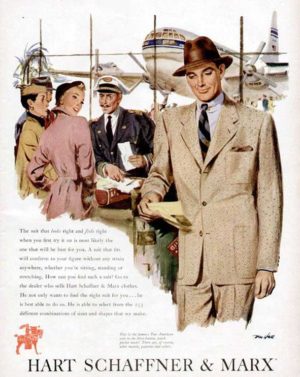
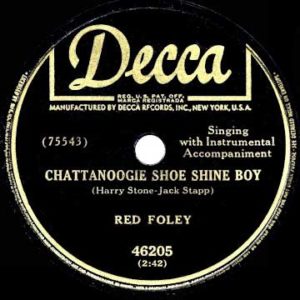 In the record stores: “Chattanoogie Shoe Shine Boy” by Red Foley, “Music! Music! Music! (Put Another Nickel In)” by Teresa Brewer and the Dixieland All-Stars, There’s No Tomorrow, by Tony Martin, “The Cry of the Wild Goose” by Frankie Lane, “Rag Mop” by the Ames Brothers, “I Said My Pajamas” by Tony Martin and Fran Warren, “It Isn’t Fair” by Don Cornell and the Sammy Kaye Orchestra, “Quicksilver” by Bing Crosby and the Andrew Sisters, “If I Knew You Were Coming I’d’ve Baked a Cake” by Eileen Barton. “Rag Mop” by Ralph Flanagan and his Orchestra.
In the record stores: “Chattanoogie Shoe Shine Boy” by Red Foley, “Music! Music! Music! (Put Another Nickel In)” by Teresa Brewer and the Dixieland All-Stars, There’s No Tomorrow, by Tony Martin, “The Cry of the Wild Goose” by Frankie Lane, “Rag Mop” by the Ames Brothers, “I Said My Pajamas” by Tony Martin and Fran Warren, “It Isn’t Fair” by Don Cornell and the Sammy Kaye Orchestra, “Quicksilver” by Bing Crosby and the Andrew Sisters, “If I Knew You Were Coming I’d’ve Baked a Cake” by Eileen Barton. “Rag Mop” by Ralph Flanagan and his Orchestra.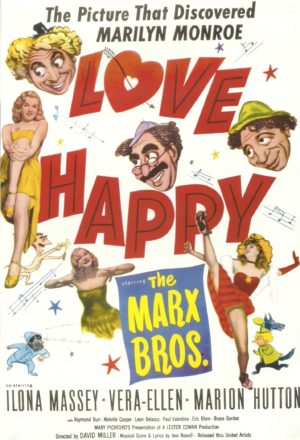
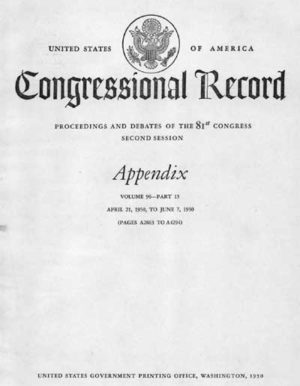
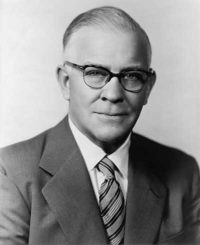
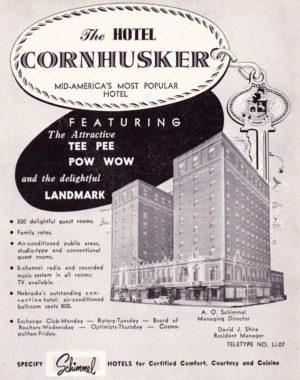
 In the record stores: “The Third Man Theme” by Anton Karas, “If I Knew You Were Coming I’d’ve Baked a Cake” by Eileen Barton, “The Third Man Theme” by Guy Lombardo and his Orchestra, “It Isn’t Fair” by Don Cornell and the Sammy Kaye Orchestra, “Music! Music! Music!” by Teresa Brewer, “My Foolish Heart” by Gordon Jenkins, “Sentimental Me” by the Ames Brothers, “Bewitched” by Bill Snyder and His Orchestra, “Daddy’s Little Girl” by the Mills Brothers, “My Foolish Heart” by Billy Eckstine.
In the record stores: “The Third Man Theme” by Anton Karas, “If I Knew You Were Coming I’d’ve Baked a Cake” by Eileen Barton, “The Third Man Theme” by Guy Lombardo and his Orchestra, “It Isn’t Fair” by Don Cornell and the Sammy Kaye Orchestra, “Music! Music! Music!” by Teresa Brewer, “My Foolish Heart” by Gordon Jenkins, “Sentimental Me” by the Ames Brothers, “Bewitched” by Bill Snyder and His Orchestra, “Daddy’s Little Girl” by the Mills Brothers, “My Foolish Heart” by Billy Eckstine.
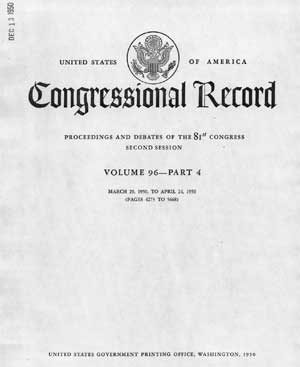
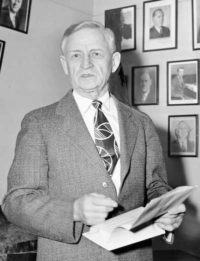
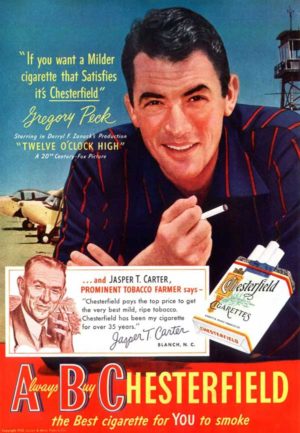

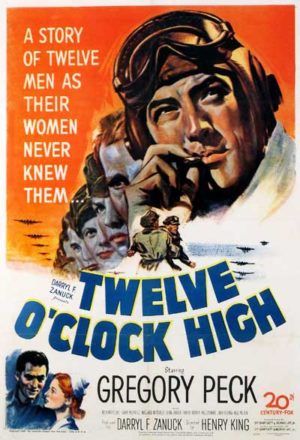

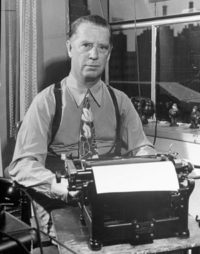 In the history of the United States, no situation ever existed before the long Roosevelt regime which was even comparable to that which was revealed recently by John E. Peurifoy, a deputy under-secretary of state, who testified that 91 homosexuals had been dismissed from the State Department. Homosexual means a person who has relations with another of the same sex. It is common knowledge that such persons have psychic ways of seeking one another. They flock together and are secretive and without honor. They are not beneath shame, however, and this makes them the more dangerous in positions of trust and “delicacy” in a government. Being furtive and ashamed, they are susceptible to blackmail and threats of exposure.
In the history of the United States, no situation ever existed before the long Roosevelt regime which was even comparable to that which was revealed recently by John E. Peurifoy, a deputy under-secretary of state, who testified that 91 homosexuals had been dismissed from the State Department. Homosexual means a person who has relations with another of the same sex. It is common knowledge that such persons have psychic ways of seeking one another. They flock together and are secretive and without honor. They are not beneath shame, however, and this makes them the more dangerous in positions of trust and “delicacy” in a government. Being furtive and ashamed, they are susceptible to blackmail and threats of exposure.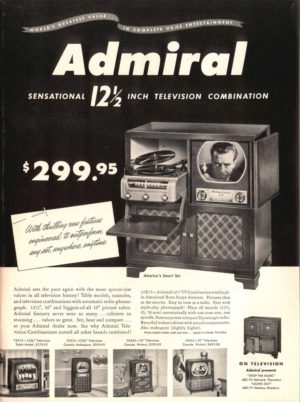
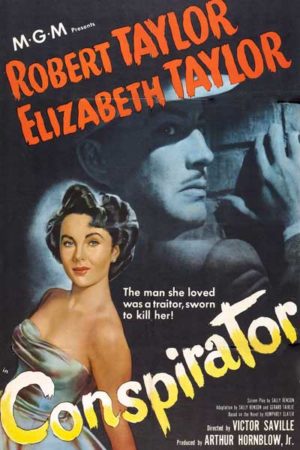
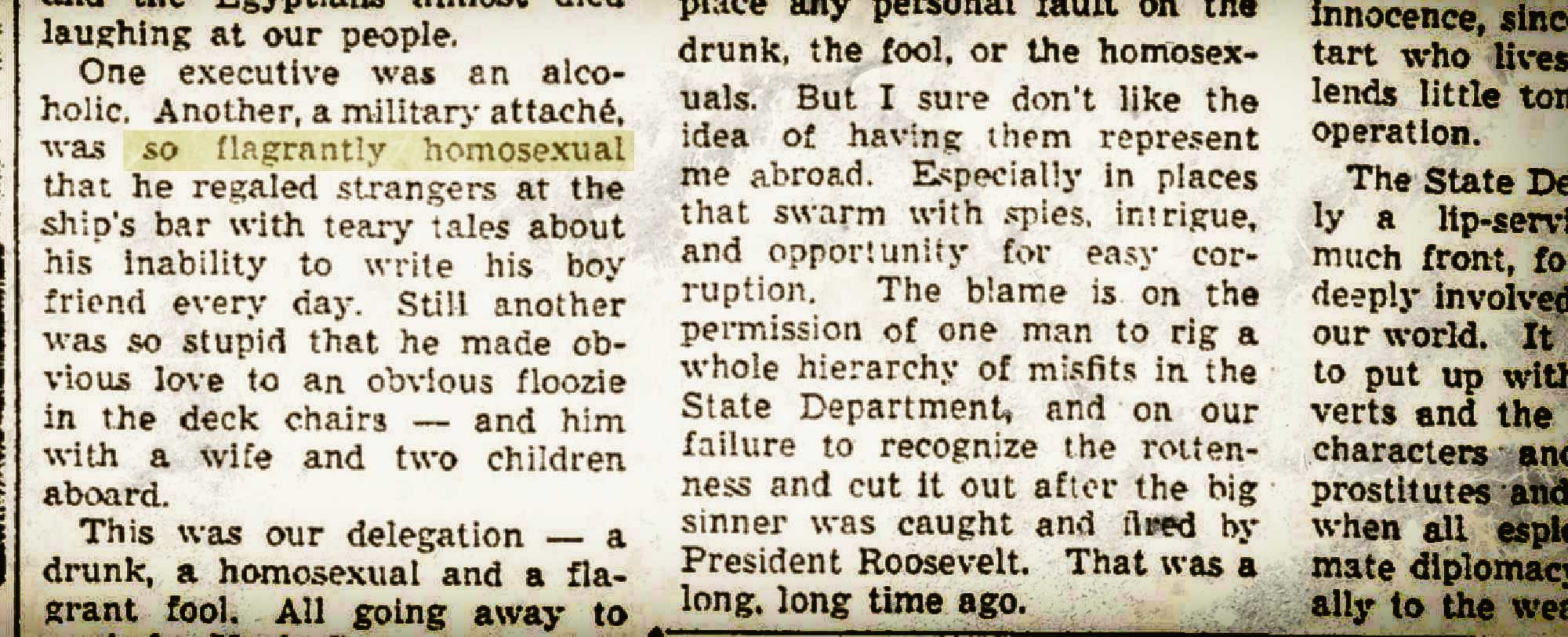
 On
On 